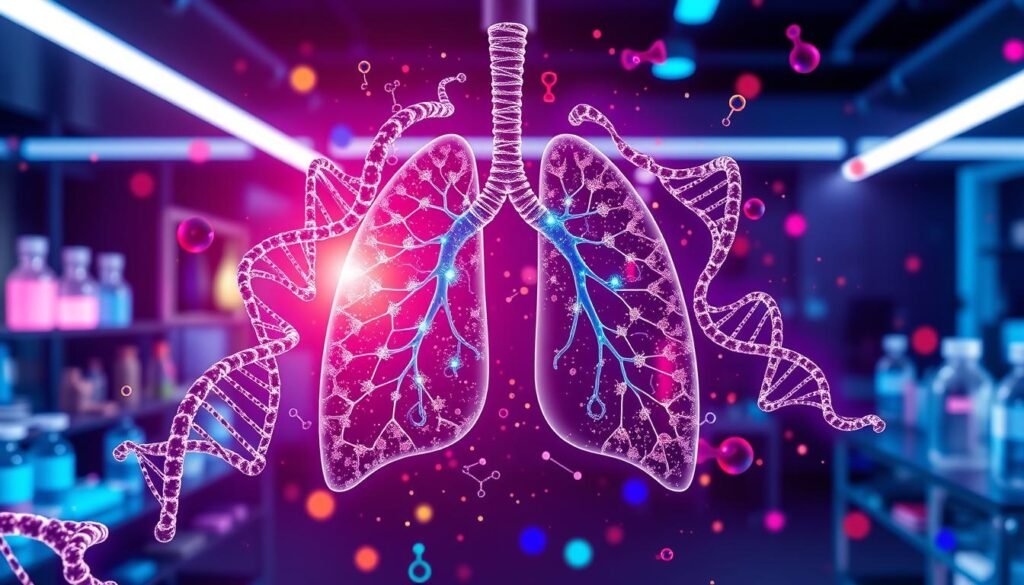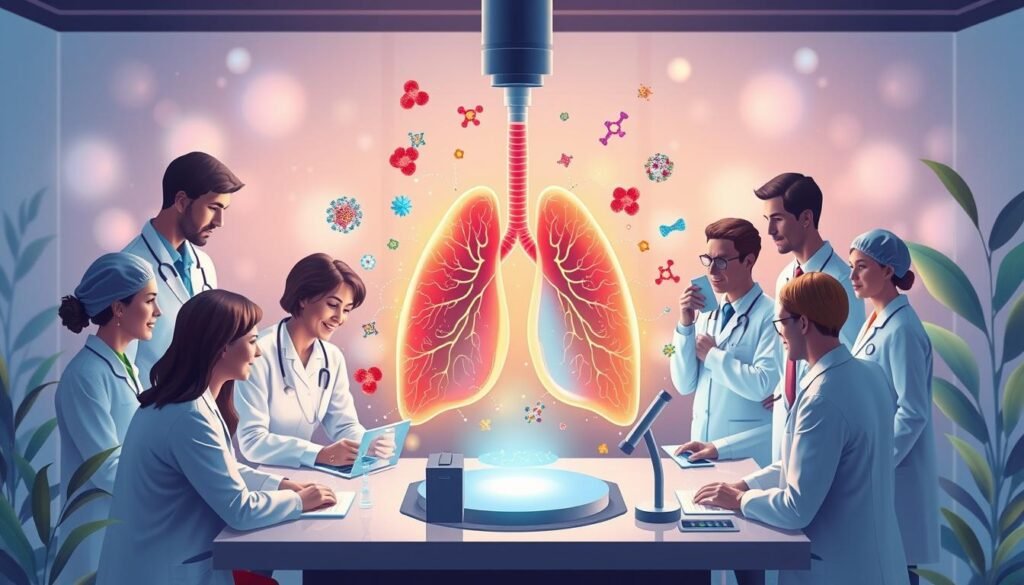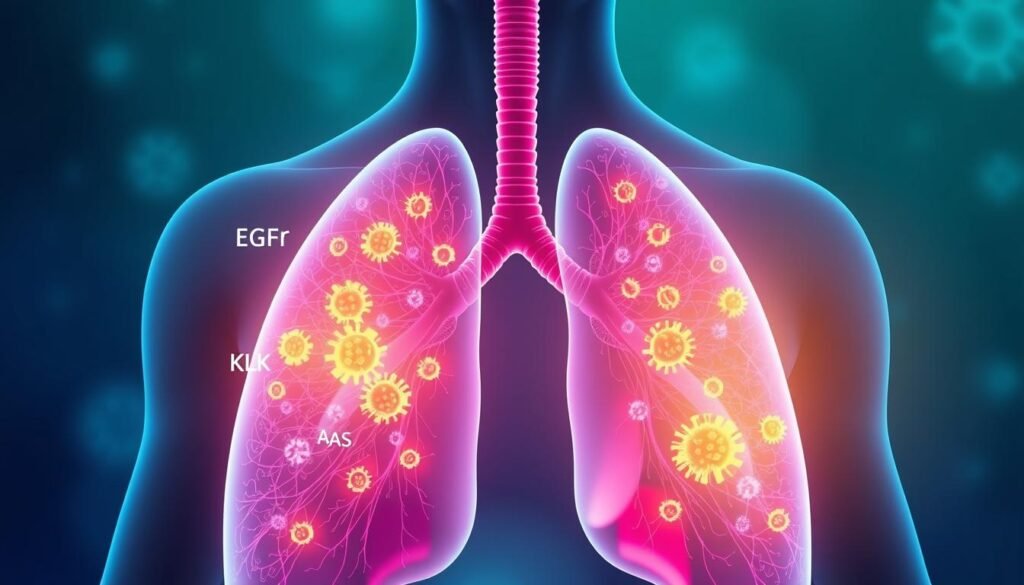Did you know over 70% of lung cancer patients see benefits from biomarker testing? It identifies specific genetic mutations. These mutations greatly influence their treatment plans. Precision oncology in lung cancer uses this approach. It tailors treatments to each patient’s cancer profile. In this article, you’ll learn about the importance of biomarker testing in lung cancer. We’ll discuss its impact on treatment choices and the detailed testing process. This knowledge will help patients make informed choices in their cancer care.
Key Takeaways
- Biomarker testing identifies mutations, deletions, or rearrangements in DNA.
- Patients with non-small cell lung cancer (NSCLC) should undergo comprehensive biomarker testing.
- Driver mutations like ALK, EGFR, and KRAS can direct targeted therapies.
- Immunotherapy biomarkers such as PD-L1 are vital for lung cancer treatment.
- Current research is advancing our understanding of early-stage lung cancer biomarkers.
- Personalized lung cancer treatment is made possible through careful biomarker analysis.
Understanding Biomarkers in Lung Cancer
Biomarkers are key in lung cancer research and care. They’re biological markers in blood or tissues. They show the cancer’s condition. These markers help identify lung cancer specifics for precise treatment. They reveal certain mutations or protein levels that worsen the disease.
Definition and Importance of Biomarkers
Biomarkers are crucial for custom treatments in lung cancer. They point to tailored therapies for each patient. Tests for biomarkers are advised for those with non-small cell lung cancer (NSCLC). This is to find specific mutations like EGFR, ALK, KRAS, and others. Knowing these helps pick the best treatment for each lung cancer type.
How Biomarkers Relate to Cancer
Biomarkers reveal cancer traits and growth patterns. They are important for understanding lung cancer’s genetics. High lung cancer rates, especially in African Americans, stress the need for fast and effective testing. Ongoing biomarker research improves patient care decisions. This leads to better treatment results.
What is Biomarker Testing in Lung Cancer?
Biomarker testing is key in the fight against lung cancer. It helps find specific tumor markers that can change treatment courses. By checking the changes in tumor DNA, doctors can understand cancer better. This knowledge is vital as lung cancer treatment options grow, helping both doctors and patients.
Types of Testing Available
There are a few tests doctors use to look for biomarkers in lung cancer. The main ones are:
- Tissue Biopsies: This method gets tumor samples through different procedures. It gives a close look at the mutations in the tumor.
- Liquid Biopsies: The FDA said okay to this test in 2020. It checks the DNA from tumors in the blood and is less invasive. It is fast and can track tumor changes over time.
How Testing is Conducted
The process for biomarker testing is detailed and specific to each patient. It usually starts with:
- Getting a referral from the doctor for genomic testing.
- Gathering tissue or blood samples, based on the test method.
- Testing the samples in labs with advanced tools that look at many biomarkers at once.
Getting the test results can take time, depending on the samples’ size and type. The results of lung cancer genomic testing help doctors suggest the best personalized treatment. If mutations are found, targeted therapies, which block cancer growth, might be used. Without treatable mutations, patients might get standard treatments like chemotherapy or radiation.

| Testing Method | Advantages | Limitations |
|---|---|---|
| Tissue Biopsy | Detailed look at mutations | Invasive; not for everyone |
| Liquid Biopsy | Less invasive; quick updates | Only finds certain tumor DNA |
To wrap up, biomarker testing in lung cancer gives essential info for treatment choices. This can lead to better results for patients.
Why is Biomarker Testing Important?
Biomarker testing is key in treating lung cancer. It looks at genetic changes in cancer cells. This helps pick the right treatment path. If you have non-small cell lung cancer (NSCLC), checking these markers is crucial to get the best treatment.
Influence on Treatment Options
Biomarker testing guides us to the right treatment. It shows if targeted therapy for lung cancer will work. Targeted therapy attacks cancer cells by focusing on specific genetic changes. This testing helps doctors choose the best treatment plan.
It’s important for patients to talk with their doctors about biomarker testing. Knowing about it can help you understand its role in your care. The importance of tailored testing is clear. It leads to better treatment results by providing care that fits you.
Personalized Lung Cancer Treatments
Personalized treatment for lung cancer is based on your cancer’s genetic makeup. Doctors use biomarker testing to find the best approach for you. This ensures the treatment targets your cancer’s specific mutations.
This approach increases the chance of success and avoids treatments you don’t need. Targeted therapies, like those for ALK gene rearrangements and EGFR mutations, are very effective. They ensure patients receive the most effective treatment strategy.

Types of Lung Cancer Biomarkers
It’s important to know about lung cancer biomarkers. They help doctors treat patients better. There are two main types: driver mutations and immunotherapy biomarkers.
Driver Mutations
Driver mutations are changes in genes that help lung cancer grow. Some key mutations are:
- EGFR mutations
- ALK rearrangements
- KRAS mutations
- BRAF V600E mutation
- NTRK fusion
About 30% of non-small cell lung cancer patients have KRAS mutations. Around 10% of adenocarcinoma cases show EGFR mutations. Finding these mutations is key. Targeted therapies can block the pathways these mutations activate. This offers personalized treatment plans.
Comprehensive biomarker testing is mainly used for non-small cell lung cancer. It identifies specific mutations that help cancer cells grow.
Immunotherapy Biomarkers
Immunotherapy biomarkers show how lung cancer hides from the immune system. The PD-L1 biomarker is really important. It checks if the tumor can avoid the immune system. Knowing about these biomarkers helps doctors choose the best treatment.
Precision medicine uses these markers to pick treatments that are more likely to work. This improves how well treatments work.

Understanding driver mutations and immunotherapy biomarkers leads to better treatment plans. This can help increase survival rates. For more details on these treatments, visit this resource.
Comprehensive Biomarker Testing Process
The journey of comprehensive biomarker testing starts by tailoring initial recommendations to the patient’s health status and their specific kind of lung cancer. In the case of non-small cell lung cancer (NSCLC), it’s often advised to do extensive molecular profiling. This helps find specific genetic changes that could guide the choice of treatment.
Initial Testing Recommendations
At first, tests mainly look for well-known biomarkers like EGFR and ALK. These are linked with big improvements in health. More than 80% of NSCLC patients are tested for these mutations. This highlights how vital they are in making treatment choices.
For example, testing for the ROS1 marker is done in 88% of cases. Meanwhile, PD-L1 is checked in 57% of advanced nonsquamous NSCLC patients. Knowing these details helps doctors pick targeted therapy or immunotherapy. These options can increase survival rates compared to standard treatments.
Liquid vs. Tissue Biopsies
When it comes to types of testing, choosing between liquid and tissue biopsies is important. Tissue biopsies give clear results. They allow for precise genetic profiling in lung cancer. But liquid biopsies are becoming popular as they’re less invasive.
This is especially true for patients who can’t have surgery. Studies show that liquid biopsies match tissue tests 68% of the time. This highlights their growing role in medicine. Each testing method has its own pros and cons. It’s key that patients and doctors know what each entails.
| Biomarker | Testing Rate | Importance |
|---|---|---|
| EGFR | 79% – 99% | Targeted therapy eligibility |
| ALK | 79% – 99% | Targeted therapy eligibility |
| ROS1 | 88% | Targeted therapy eligibility |
| PD-L1 | 57% | Immunotherapy eligibility |
| BRAF/KRAS/MET/RET/HER2/ERBB2 | 5% – 73% | Emerging treatment relevance |
Predictive Biomarkers and Targeted Therapy in Lung Cancer
Understanding predictive biomarkers is vital for creating lung cancer therapies. These markers help us know who will likely respond best to specific treatments. This knowledge leads to care that’s tailored for each person.
Common Predictive Biomarkers
EGFR and ALK mutations are key markers in lung cancer. About 15% of lung adenocarcinomas in the West show EGFR mutations. In Asia, this rises to 35-50%. These mutations are the basis for targeted lung cancer treatment. EGFR tyrosine kinase inhibitors (TKIs) boost survival rates. Meanwhile, ALK-positive lung cancer has activating translocations in 2-7% of cases. Drugs like crizotinib have shown a 60.8% success rate in trials.
Benefits of Targeted Therapy
Targeted therapies work directly on cancer cell growth paths. This means they’re often more effective and gentler than traditional chemotherapy. For instance, advanced NSCLC patients with specific EGFR mutations respond well to TKIs. Their survival can reach about 24 months. Plus, high PD-L1 expression in some patients predicts a good reaction to immunotherapies. Using biomarkers for personalized treatment improves results and life quality. Thus, predictive biomarkers are crucial in modern lung cancer care.
The Role of Molecular Tumor Boards
Molecular tumor boards are key in precision oncology for lung cancer. These teams have doctors from different fields who work together. They look at cancer cases by analyzing test results and the newest research. This helps decide the best treatment for patients.
What are Molecular Tumor Boards?
Molecular tumor boards include various specialists like oncologists and pathologists. They meet to talk about tough cancer cases. They look at a lot of patient data, including genetic information from tests. Their goal is to make lung cancer treatment better by finding what works for each person.
How They Assist in Treatment Decisions
Molecular tumor boards do more than just discuss cases. They look at key biomarkers, check who can get certain therapies, and look at new treatment options. For patients with a certain type of lung cancer, they suggest detailed testing. Studies show that their advice often leads to better results for patients, with longer times without cancer getting worse.
Navigating Your Care Journey
Patients with lung cancer face many challenges. Knowing how to navigate cancer care is crucial. A structured approach boosts confidence during treatment.
Checklist for Patients
A checklist is very helpful for lung cancer patients. It should include key points:
- Understand the importance of biomarker testing to identify specific genetic alterations in cancer cells.
- Seek comprehensive biomarker testing recommended for all lung cancer patients to tailor personalized treatment plans.
- Consult with healthcare providers regarding various treatment options and potential clinical trials.
- Leverage support networks, including social workers and palliative care doctors, for emotional and practical assistance.
- Visit the checklist for biomarker testing to ensure all necessary steps are taken.
Staying Informed about Your Options
Keeping up with treatment options is key for lung cancer patients. Understanding companion diagnostics is empowering. Resources like videos from the Lung Ambition Alliance help.
The Lung Cancer Support Line offers help at (844) 835-4325. Right Track by LUNGevity guides newly diagnosed patients to the right treatments.
Conclusion
The fight against lung cancer is changing fast. Thanks to biomarker testing in lung cancer, doctors can now personalize how they treat it. They spot critical genetic changes and biomarkers. This means patients can get targeted treatments. These have a big impact on their health and how long they live.
About every two and a half minutes, someone in the U.S. learns they have lung cancer. But shockingly, only 4.5% get screened early on. Many get chemo and radiation without full biomarker tests. This delays getting the right treatment. Following biomarker testing guidelines can greatly help survival rates. It’s vital for doctors to do these tests early.
To face lung cancer head-on, doctors and patients need to talk about biomarker testing. They must understand its role before surgery and face any access issues. To learn how biomarker testing guides treatment, educating oneself is key. This knowledge can boost your chances and bring hope in your battle with lung cancer.